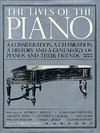James R. Gaines (1) (1947–)
Auteur van Een avond in het paleis van de rede
Voor andere auteurs genaamd James R. Gaines, zie de verduidelijkingspagina.
Over de Auteur
A native of Dayton, Ohio, James R. Gaines is the former managing editor of Time, Life, and People magazines and the author of several books, including Wit's End: Days and Nights of the Algonquin Round Table and, most recently, Evening in the Palace of Reason, a book that explains the clash of the toon meer Baroque and the Enlightenment and the conflict between faith and reason through the music of Johann Sebastian Bach toon minder
Werken van James R. Gaines
Tagged
Algemene kennis
- Geboortedatum
- 1947-08-11
- Geslacht
- male
- Nationaliteit
- USA
- Woonplaatsen
- Washington D.C, USA
Paris, France - Opleiding
- McBurney School
University of Michigan - Beroepen
- editor
- Organisaties
- Time Inc.
Leden
Besprekingen
Lijsten
Prijzen
Misschien vindt je deze ook leuk
Statistieken
- Werken
- 8
- Leden
- 956
- Populariteit
- #26,957
- Waardering
- 3.9
- Besprekingen
- 13
- ISBNs
- 33
- Talen
- 3
- Favoriet
- 2















The portraits of these people make for fascinating reading and the documentation for anyone wanting to read further is extensive. This not only gives credit where it has sometimes been scarce but serves as a great starting point for readers who want to know more.
I do have two relatively minor issues, one of which will likely be corrected before publication. First, I am afraid the hyperbole of the marketing copy will turn some people off. No one believes these movements formed ex nihilo in the 60s, of course there were people in the 50s, and before, who went against the status quo. That does not "upend the myth of the fifties," it simply shows who some of these people were.
My second issue, while likely corrected in the final version, makes me question just what Gaines' foundational knowledge is in some areas. He no doubt is well read and intelligent, but to attribute Bigger Thomas to Ralph Ellison would seem to show exactly where his blind spots are in his literary and cultural history. That goes a bit beyond a typo or incorrect dates, it is attributing a major character to the incorrect major author. This happened in the introduction which put the entire rest of the book under a cloud for me.
Those things aside I would still recommend this book to those interested in reading about early figures in social justice issues as well as those who like to read about something other than the dominant narrative about the middle of the last century.
Reviewed from a copy made available by the publisher via NetGalley.… (meer)